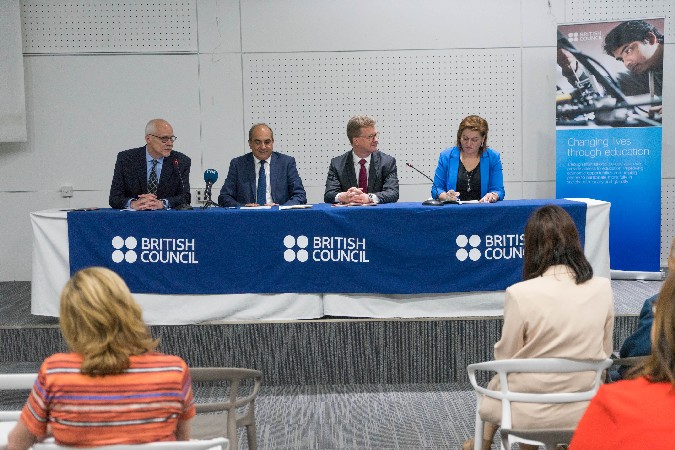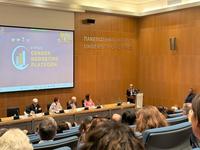Press Releases

09-05-2019 10:19
Address by the President of the House of Representatives, Mr Demetris Syllouris, at “The Higher Education and Research Forum: The future of UK-Cyprus collaboration post-Brexit”
I would like to thank the British Council Cyprus for inviting me to take part in this Press conference. With my presence here, today, I like to highlight the importance Cyprus attaches to its higher education sector in general and to developing further the already close educational ties and collaboration with the UK, in particular.
The first Higher Education and Research Forum organized by the British Council last February provided a unique and much needed opportunity for a vibrant and fruitful exchange of views between UK and Cyprus higher education policy makers and actors, in the backdrop of Brexit developments. The report presented today outlines concisely the issues raised at the Forum, the conclusions and the recommendations for moving collaboration between Cyprus and the UK forward. It was agreed by all that Cyprus as member of both the EU and the Commonwealth is in a unique position to seize opportunities arising after Brexit, for targeted collaborations with UK universities and institutions, to the benefit of both our countries.
It is these issues that I had the opportunity to discuss further in my recent visit to the UK, in March 2019, where I had the honour to address a large audience of UK higher education actors, as a keynote speaker at the International Higher Education Forum 2019, organized by the Universities UK international at Imperial College London. The focus, inevitably, was on the effects of Brexit and the ongoing uncertainty by the lack of consensus on a withdrawal agreement. Some of the wider questions posed included the effect of Brexit on current and future UK-European higher education relations and the overall linkage between geopolitical developments and international university engagement.
In my speech, as well as in meetings I had with representatives of educational bodies and Universities, I reassured them that Cyprus will continue to safeguard its already established collaboration with the UK in the fields of education, research and innovation. Both Cyprus and the UK have a lot to gain from an enhanced cooperation that takes advantage of the already established transnational education (TNE) collaborations, the possibilities offered by technological advancements and especially the Fourth industrial revolution, as well as possibilities for collaboration within the framework of networks such as the Commonwealth.
The higher education sector is an important contributor to the Cyprus economy. The House of Representatives is fully aware of the importance of the education sector for the local economy and in particular of the opportunities that it provides for a move away from a service-based approach, towards a research and innovation focused model.
At the same time, the House of Representatives aims at ensuring that citizens continue to enjoy the benefits and opportunities of a close relationship between the UK and Cyprus, despite the uncertainty brought about by Brexit. Throughout the Brexit negotiations, Cyprus has followed a constructive approach, aiming to ensure that ties and collaboration between the UK and its EU partners shall continue to grow, albeit on a different basis.
Bearing in mind all the above, the House Standing Committee on Education and Culture in close collaboration with all parties concerned, including the Ministry of Foreign Affairs and the Ministry of Education and Culture, has acted swiftly to ensure that the already established collaborations between UK and Cyprus higher education and research institutions shall continue unimpeded. To this effect, we succeeded in amending the relevant legislation, governing TNE and cross-border collaborative arrangements (franchises) with foreign universities, ahead of the initial 29 March 2019 threshold, so as to avoid the creation of legal gaps and prevent vagueness or uneasiness as the UK prepares to leave the EU.
In addition, I have personally promoted, through meetings I held in London, the forging of an even closer link with Commonwealth institutions including the Association of Commonwealth Universities (ACU). As a member of the Commonwealth since 1961, Cyprus fully supports the setting up of targeted programmes that promote student exchanges within the Commonwealth, the mutual recognition of degrees and the funding of joint research programmes. Within this framework and following relevant fruitful exchanges, the ACU has decided to set up an office in Cyprus, their first office outside the UK. This move will bring about significant benefits and opportunities not only for ACU members but for all higher education institutions in Cyprus.
In closing, I should emphasize once again that we highly appreciate and treasure the excellent cooperation and close ties that Cyprus and the UK enjoy, particularly in the field of education.
I am confident that through collective action both our countries can successfully face any challenge and move ahead towards the establishment of a dynamic and vibrant educational and research environment, that benefits not only institutions and the economy but most importantly students and society as a whole.
Thank you.
(ML)






